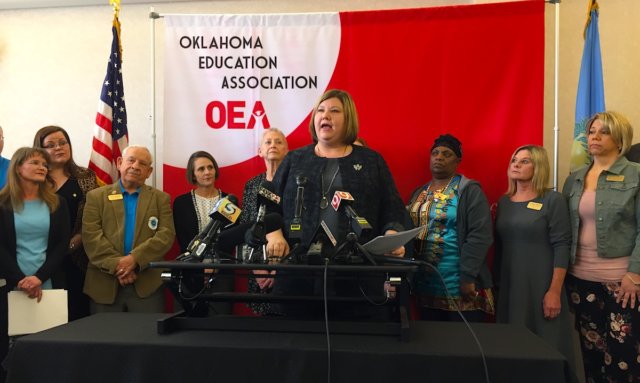
The Oklahoma Education Association and the Oklahoma Public Employees Association announced today that an April 2 school walkout can be averted if lawmakers create $812 million in new revenue for teacher, support staff and public employee pay raises.
The Legislature is already searching for more than $300 million to fill the existing estimated budget gap.
“Oklahoma educators have reached a breaking point. We will not allow our students to go without any longer,” said OEA president Alicia Priest. “Today, we demand the Legislature pass a budget with the necessary revenue to provide teachers and support professionals a significant pay raise and restore critical funding to our classrooms.”
Priest spoke at OEA’s press conference, which came after weeks of public and private discussions about a potential teacher strike. The association initially set April 23 as a walkout deadline but moved the deadline up three weeks to April 2, one day after lawmakers are statutorily supposed to pass an education budget, which has almost never happened in the past two decades.
Educators in West Virginia struck recently before receiving a 5 percent pay increase, and Priest said OEA will lead the way toward similar action in Oklahoma if no raise is passed.
“We know this movement is already making an impact because today we hear the Legislature is working on a $2,000 teacher pay raise,” Priest said. “That’s too little too late. Today, we demand a $6,000 pay raise for this year with additional compensation to follow with a total of $10,000 over three years.”
Priest turned the microphone over to Kim Morris of Mannford, a town of 3,000 people in Creek County.
“I love our children. I live to get up to go to school for their hugs and their smiles and their ‘ah-ha’ moments. But I can’t do this anymore. My family has suffered financially,” Morris said. “This is enough. I don’t want to see schools across Oklahoma to shut down, but if we have come to the point where the Legislature will not do its job, I will walk out.”

Morris detailed how past budget cuts for schools have created cost-saving policies at her school, such as turning off half of the building’s lights.
“Our thermostats have been turned down to 63 degrees, so we are wearing our coats and our jackets in our classroom,” Morris said. “Our children should not have to go to school in the cold or the dark, but it is very necessary for us to do this so our district can save money.”
Priest and Morris echoed one another, saying that a school walkout is not their preference.
“We do not want to shutdown schools and leave our classrooms to come to the Capitol, but we will,” Priest said.
Chuck McCauley, superintendent of Bartlesville Public Schools, said he believes lawmakers can achieve a pay raise if they “work together.”
“I’m confident. Our legislators have been close,” McCauley said to laughter. “I don’t know why I’m confident, but they can do this if they work together. I want to be in school April 2.”
Priest said the $10,000 pay raise number is realistic because “where there is a will, there is a way.”
Asked if the school walkout would continue from April 2 until a resolution is reached, she answered affirmatively.
“Schools will stay closed until we get what we are asking for,” Priest said, declining to discuss the motivations of Democrats and Republicans alike who have opposed past tax-raising efforts. “This is about kids. This is about economic development in Oklahoma.”
House speaker blames Democrats, says ‘multiple options available’
About an hour before OEA’s press conference, House Speaker Charles McCall (R-Atoka) released a statement that opened by saying his caucus has voted for teacher pay proposals and funding “without much help” from Democrats.
In November, a greater percentage of House Democrats than House Republicans voted in favor of the “A+ Plan” that would have yielded a $6,000 teacher pay raise over three years. In February, a greater percentage of House Republicans than House Democrats voted in favor of the Step Up Oklahoma plan that would have yielded a $5,000 teacher pay raise in one year.
Part of McCall’s statement appears here:
There are currently multiple options available to help provide a pay raise without requiring 76 votes and help from House Democrats, including House Bill 2403, which would provide $106 million and is awaiting a hearing in the Senate. Today, we passed a bill off the House floor that would provide an additional $22 million in revenue, and there are other ideas being discussed that could potentially help us fully fund a substantive pay raise for teachers this session.
There will be ongoing discussions in the coming weeks on how we can find even more revenue to help our teachers. The Republican Caucus is the only caucus in the House that has supported raising revenue for education, teacher pay and healthcare during the last 14 months. At some point, the House Democrats’ votes have to match their rhetoric.





















